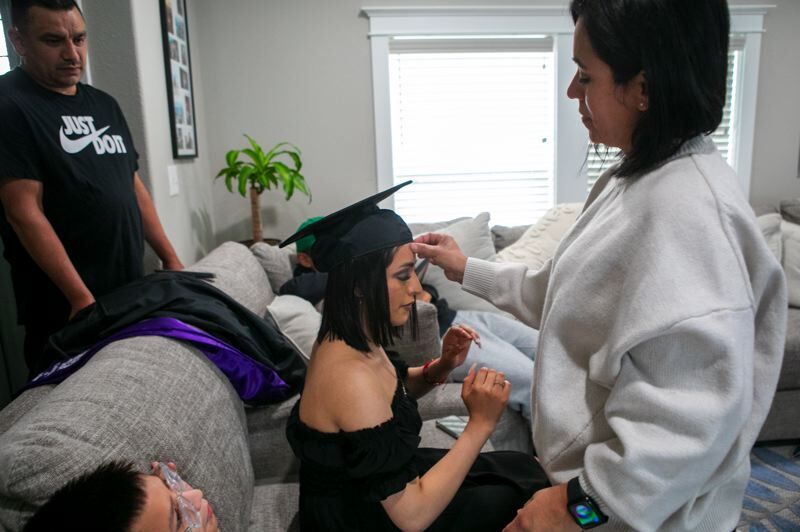A DACA journey: One Portlander gets to ‘Dream’ anew
Published 12:00 am Tuesday, May 18, 2021

- Bibiana Rivera's mom, Maria Espindola, adjusts her cap before graduating from University of Portland virtually as her father, Antonio Rivera and younger brother, Christian, watch.
Bibiana Rivera Espindola sat in her living room as her brother connected the television to an online stream, broadcasting a virtual commencement ceremony from the University of Portland.
Trending
She was moments away from becoming the first person in her family to graduate from college.
Rivera’s mother, Maria Espindola, helped adjust her cap and set her tassel in place. Her father, Antonio Rivera, draped a purple stole on her shoulders.
As graduating students were honored one-by-one, the family followed along in the commencement program, counting down the names until Rivera’s would be announced.
Trending
For Rivera, who is undocumented, this day came on the heels of years of uncertainty. When she was 3 years old, she and her family crossed the border from Mexico into the United States. As immigration policy shifted throughout the decades, the chance for Rivera to attend and graduate from college had not always been guaranteed.
A chance to dream
At a wide, grassy park near the apartment complex where she grew up, Rivera sat and watched her youngest brother run across the playground.
It made her think of her own childhood, when she’d spend weekends at this park playing with her cousins.
“It was really nice to find a place to escape and, like, be a kid,” Rivera said.
As the eldest in her family, Rivera had to grow up fast. She took on a lot of responsibilities at a young age, studying hard while helping to raise her three younger brothers.
Rivera was in middle school when she learned that she was undocumented — and what that meant.
“I realized I couldn’t do a lot of the things that I wanted to do,” Rivera said. As an undocumented immigrant, she wouldn’t be able to apply for a driver’s license, get a job or travel outside the United States.
Suddenly, she understood her parents’ struggles in a new light. They worked long hours to make ends meet, her mother cleaning houses and her father painting buildings. Because of their status, they were ineligible for work that required a Social Security number.
“I saw what it means for them not to have papers, and all the struggles they had to be able to work,” Rivera said.
In 2012, then-President Obama announced the Deferred Action for Childhood Arrivals policy, which allowed undocumented people brought to the United States as children to legally work and to be temporarily exempt from deportation.
“I was like, I need to get in on that,” Rivera said.
In high school, after applying and being granted a two-year permit, she began working retail jobs and supporting her family, all while taking advanced classes.
Neither of Rivera’s parents finished middle school, but they were intent on instilling in their children a value for education.
“Like, this is why we came here,” she recalls her parents repeating to her. “You go to school and you go to college and you get a job. So you don’t end up doing the jobs that we do.”
Dreams dashed
For years, Rivera had longed to travel. She’d see peers vacationing abroad, going to all kinds of places with their families.
After she was accepted to the University of Portland on almost a full ride, she said she looked forward to studying abroad in Spain. Above all, she dreamed of traveling to Mexico during one of her breaks.
“I really wanted to go back and visit the place that I was born,” Rivera said.
But in 2017, during her freshman year of college, the Department of Homeland Security stopped approving advanced parole, a process through which DACA recipients had been able to get permission to travel outside the United States. This meant Rivera could not leave the country and be allowed back in.
As she’d watch the news with her family after commuting home from her classes, she’d see reports of the separation of families at the border, reports of missing migrant children.
“Just seeing those things made me super angry,” Rivera said. “Seeing the conditions that these people, like human beings are in just because of their status. It was definitely heartbreaking for all of us just to see that.”
She wanted to vote, but as a noncitizen she wasn’t eligible. She wanted to participate in protests in support of immigrant rights and Black Lives Matter, but she couldn’t risk the slightest chance of getting arrested and losing her DACA status.
Rivera found other ways to make an impact. As a part of an immersion program at the University of Portland, she traveled with classmates to Arizona to visit the U.S.-Mexico border. There, she left gallons of water in the desert where an unknown number of migrants have died of dehydration and the physical toll of the journey.
Seeing the border wall for the first time, with her own eyes, was a profound and heartbreaking experience.
“You can see the other side,” she said. Peering through the bars of the border wall, she saw colorful houses, crosses where people had been shot at, kids and families going about their day.
“It was really sad for me to see, like, this is the closest I’m getting to home, right now. Like now that I can’t go.”
She came away from the experience, and from college, with a newfound sense of purpose.
“It definitely taught me a lot on how to be an advocate,” Rivera said. “Not only for myself, but for other people.”
Dreaming for the whole family
About an hour into her virtual graduation ceremony, a picture of Rivera flashed across the screen, along with the text: Bibiana Rivera Espindola, Bachelor of Social Work, minor in Spanish.
She broke out into a big smile, hugged her father and brothers, lingered in an embrace with her mother, who then ran into the kitchen and came back out with a bouquet of flowers.
“It’s been a dream of mine to see her graduate college,” said Maria Espindola, speaking in Spanish. “My daughter is an example. In life, there any many obstacles. You just have to be persistent and keep moving.”
Next week, Rivera will start a new job, working for Clackamas County to advocate for people who couldn’t pay rent because of the pandemic.
“I feel like I can definitely understand where a lot of them might be coming from, especially if they’re undocumented,” Rivera said.
This summer, she’s hoping to visit Mexico for the first time since she left as a toddler, thanks to a recent restoration of the provision allowing DACA recipients to apply for international travel. She wants to attend her aunt’s wedding and visit her dad’s side of the family, most of whom she’s only ever seen on FaceTime.
After the virtual commencement, Rivera’s father Antonio stood outside the house, which they had just moved into six months ago. It was the family’s first house of their own after 20 years of renting.
“Finally,” he said, with a sigh of relief. With a house, a daughter graduated from college, and the small business he recently founded, he had come a long way since coming to the United States.
For years, her parents were never able to buy a house because they could not secure a mortgage loan as undocumented workers. As DACA recipients with Social Security numbers and a stable proof of income, Rivera and her brother Antonio Rivera Jr. qualified for a loan that made it possible for the family to buy a home in their names.
“Like now I know that they have a place where they can grow older,” Rivera said. “Where they won’t have to worry about paying rent each month or having to share space with a bunch of other people.”
Before they moved in, her parents remodeled the entire house, changing the carpet and the door frames, adding personal touches everywhere.
“They made it the way they want it,” Rivera said. “They’re living in a place that feels like a home.”
Dream Act in D.C.
President Joe Biden has asked Congress to pass the American Dream and Promise Act, which, according to the Washington Post, would grant citizenship to an estimated 2.7 million undocumented immigrants who arrived as children or who have temporary permission to stay in the United States. The House passed the American Dream and Promise Act in March. It is stalled in the Senate.







